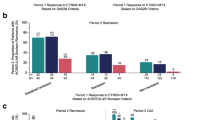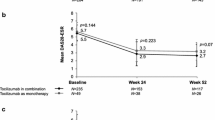Abstract
Adverse events (AEs) are common during disease-modifying antirheumatic drug (DMARD) treatment, but their influence on treatment results is unclear. We studied AEs in relation to disease activity in early rheumatoid arthritis (RA). Ninety-nine patients started intensive treatment with three conventional synthetic DMARDs (csDMARDs) and oral prednisolone, and were randomized to a 6-month induction treatment with infliximab or placebo. All AEs during the first 12 months of treatment were recorded. We scored each AE based on severity (scale 1–4) and defined the burden of AEs as the sum of these scores. Patients were divided into tertiles according to the burden of AEs. As outcomes, we assessed 28-joint disease activity score (DAS28) levels and remission rates at 12 and 24 months. Three hundred thirty-one AEs in 99 patients were reported, and 27 (8%) were categorized as severe or serious. Mean burden of AEs per patient was 5.4 ± 4.3. Seventy-nine AEs (24%) led to temporary (n = 52) or permanent (n = 27) csDMARD discontinuation. Of discontinuations, 1, 21, and 57 were detected in the first, second, and third tertiles, respectively. DAS28 remission rates decreased across tertiles at 12 months (94, 94, and 76%; p for linearity 0.029) and at 24 months (90, 86, and 70%; p for linearity 0.021). Mean DAS28 levels increased across tertiles at 12 months (1.5 ± 1.0, 1.7 ± 0.9, and 1.9 ± 1.2; p for linearity 0.021) and at 24 months (1.4 ± 0.8, 1.6 ± 1.0, and 1.9 ± 1.1; p for linearity 0.007). High burden of AEs is associated with higher disease activity and lower likelihood of remission in early RA.

Similar content being viewed by others
References
Grigor C, Capell H, Stirling A, McMahon AD, Lock P, Vallance R, Porter D, Kincaid W (2004) Effect of a treatment strategy of tight control for rheumatoid arthritis (the TICORA study): a single-blind randomised controlled trial. Lancet 364(9430):263–269. https://doi.org/10.1016/S0140-6736(04)16676-2
Puolakka K, Kautiainen H, Möttönen T, Hannonen P, Korpela M, Hakala M, Järvinen P, Ahonen J, Forsberg S, Leirisalo-Repo M, FIN-RACo Trial Group (2005) Early suppression of disease activity is essential for maintenance of work capacity in patients with recent-onset rheumatoid arthritis: five-year experience from the FIN-RACo trial. Arthritis Rheum 52(1):36–41. https://doi.org/10.1002/art.20716
Aletaha D, Smolen JS (2002) The rheumatoid arthritis patient in the clinic: comparing more than 1,300 consecutive DMARD courses. Rheumatology 41(12):1367–1374. https://doi.org/10.1093/rheumatology/41.12.1367
Agarwal S, Zaman T, Handa R (2009) Retention rates of disease-modifying anti-rheumatic drugs in patients with rheumatoid arthritis. Singap Med J 50:686–692
Cummins L, Katikireddi VS, Shankaranarayana S, KY S, Duggan E, Videm V et al (2015) Safety and retention of combination triple disease-modifying anti-rheumatic drugs in new-onset rheumatoid arthritis. Intern Med J 45(12):1266–1273. https://doi.org/10.1111/imj.12896
Leirisalo-Repo M, Kautiainen H, Laasonen L, Korpela M, Kauppi MJ, Kaipiainen-Seppanen O et al (2013) Infliximab for 6 months added on combination therapy in early rheumatoid arthritis: 2-year results from an investigator-initiated, randomised, double-blind, placebo-controlled study (the NEO-RACo Study). Ann Rheum Dis 72(6):851–857. https://doi.org/10.1136/annrheumdis-2012-201365
Smolen JS, Landewe R, Bijlsma J, Burmester G, Chatzidionysiou K, Dougados M et al (2017) EULAR recommendations for the management of rheumatoid arthritis with synthetic and biological disease-modifying antirheumatic drugs: 2016 update. Ann Rheum Dis 76(6):960–977. https://doi.org/10.1136/annrheumdis-2016-210715
Rheumatoid arthritis. Current care guidelines. Working group set up by the Finnish Medical Society Duodecim and the Finnish Society for Rheumatology (2015) Helsinki: the Finnish Medical Society Duodecim. Referred Dec 6, 2017. Available online at: www.kaypahoito.fi
Rannio T, Asikainen J, Hannonen P, Yli-Kerttula T, Ekman P, Pirila L et al (2017) Three out of four disease-modifying anti-rheumatic drug-naive rheumatoid arthritis patients meet 28-joint Disease Activity Score remission at 12 months: results from the FIN-ERA cohort. Scand J Rheumatol 46(6):425–431. https://doi.org/10.1080/03009742.2016.1266029
Contreras-Yanez I, Pascual-Ramos V (2015) Window of opportunity to achieve major outcomes in early rheumatoid arthritis patients: how persistence with therapy matters. Arthritis Res Ther 17(1):177. https://doi.org/10.1186/s13075-015-0697-z
Anderson JJ, Wells G, Verhoeven AC, Felson DT (2000) Factors predicting response to treatment in rheumatoid arthritis: the importance of disease duration. Arthritis Rheum 43(1):22–29. https://doi.org/10.1002/1529-0131(200001)43:1<22::AID-ANR4>3.0.CO;2-9
Wolfe F, Michaud K, Busch RE, Katz RS, Rasker JJ, Shahouri SH, Shaver TS, Wang S, Walitt BT, Häuser W (2014) Polysymptomatic distress in patients with rheumatoid arthritis: understanding disproportionate response and its spectrum. Arthritis Care Res 66(10):1465–1471. https://doi.org/10.1002/acr.22300
Duran J, Combe B, Niu J, Rincheval N, Gaujoux-Viala C, Felson DT (2015) The effect on treatment response of fibromyalgic symptoms in early rheumatoid arthritis patients: results from the ESPOIR cohort. Rheumatology 54(12):2166–2170. https://doi.org/10.1093/rheumatology/kev254
Lee YC, Hackett J, Frits M, Iannaccone CK, Shadick NA, Weinblatt ME, Segurado OG, Sasso EH (2016) Multibiomarker disease activity score and C-reactive protein in a cross-sectional observational study of patients with rheumatoid arthritis with and without concomitant fibromyalgia. Rheumatology 55(4):640–648. https://doi.org/10.1093/rheumatology/kev388
Listing J, Alten R, Brauer D, Eggens U, Gromnica-Ihle E, Hagemann D, Hauer R, Milleck D, Reuter U, Schlittgen R, Sörensen H, Zink A (1997) Importance of psychological well being and disease activity in termination of an initial DMARD therapy. J Rheumatol 24(11):2097–2105
McWilliams DF, Kiely PD, Young A, Walsh DA (2013) Baseline factors predicting change from the initial DMARD treatment during the first 2 years of rheumatoid arthritis: experience in the ERAN inception cohort. BMC Musculoskelet Disord 14(1):153. https://doi.org/10.1186/1471-2474-14-153
Matcham F, Ali S, Irving K, Hotopf M, Chalder T (2016) Are depression and anxiety associated with disease activity in rheumatoid arthritis? A prospective study. BMC Musculoskelet Disord 17(1):155. https://doi.org/10.1186/s12891-016-1011-1
Barsky AJ, Saintfort R, Rogers MP, Borus JF (2002) Nonspecific medication side effects and the nocebo phenomenon. JAMA 287(5):622–627. https://doi.org/10.1001/jama.287.5.622
Acknowledgements
The authors would like to thank all participating patients, other members of the NEO-RACo study group (Eeva Alasaarela, Harri Blåfield, Kari K. Eklund, Mikko Hakola, Pekka Hannonen, Kirsti Ilva, Heikki Julkunen, Oili Kaipiainen-Seppänen, Markku Kauppi, Aulikki Kononoff, Maija-Liisa Krogerus, Kari Laiho, Riitta Luosujärvi, Reijo Luukkainen, Timo Möttönen, Helena Niinisalo, Ritva Peltomaa, Jari Pöllänen, Tea Uusitalo, Toini Uutela, Heikki Valleala, Kaisa Vuori, Leena Laasonen, Eeva Moilanen, Riina Nieminen, and Katriina Vuolteenaho), and the study nurses for their contribution.
Author information
Authors and Affiliations
Consortia
Corresponding author
Ethics declarations
Conflict of interest
Laura Kuusalo has received honoraria and consulting fees (less than $10,000 each) from Bristol-Myers Squibb and Pfizer. Kari Puolakka has received honoraria and consulting fees (less than $10,000 each) from Abbvie, Bristol-Myers Squibb, MSD, Pfizer, Roche, and UCB. Hannu Kautiainen has received honoraria (less than $10,000 each) from AbbVie and Pfizer. Anna Karjalainen has received honoraria (less than $10,000 each) from MSD, Novartis, Roche, and UCB. Timo Malmi has received an honorarium (less than $10000) from Pfizer. Leena Paimela has received honoraria and consulting fees (less than $10,000 each) from Abbvie, Bristol-Myers Squibb, Pfizer, and Roche. Marjatta Leirisalo-Repo has received honoraria and consulting fees (less than $10,000 each) from AbbVie, Boehringer Ingelheim, Bristol-Myers Squibb, Lilly, Pfizer, Regeneron, and Roche. Vappu Rantalaiho has received an honorarium (less than $10000) from Bristol-Myers Squibb.
Ethical standards
The study protocol was approved by the ethics committee of the Hospital District of Helsinki and Uusimaa. The patients provided written informed consent. The study was conducted according to the Declaration of Helsinki and has been registered at http://www.clinicaltrials.gov (NCT00908089).
Rights and permissions
About this article
Cite this article
Kuusalo, L., Puolakka, K., Kautiainen, H. et al. High burden of adverse events is associated with reduced remission rates in early rheumatoid arthritis. Clin Rheumatol 37, 1689–1694 (2018). https://doi.org/10.1007/s10067-017-3958-1
Received:
Revised:
Accepted:
Published:
Issue Date:
DOI: https://doi.org/10.1007/s10067-017-3958-1




